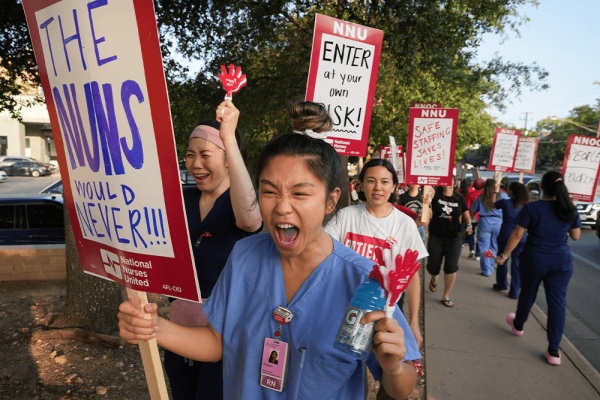One of the most troubling statistics in the country — the United States’ skyrocketing maternal mortality rate — isn’t much of a mystery to those who work in labor and delivery rooms. Underfunding, gaps in health care coverage, and hospital closures all contribute to the health care system’s state of crisis: When resources are stretched thin, birthing people, particularly Black and Latino people, and their babies don’t get the care they need.
Catholic hospitals have a long history of seeing these bleak outcomes and creating mission-driven health care systems to intervene. But now, nurses at Ascenscion, a large chain of nonprofit Catholic hospitals, say their network is prioritizing profits and making unnecessary cuts that are contributing to the crisis.
“At one time the Catholic hospitals were run largely by women religious who had devoted their lives to God and whose formation had been primarily focused on the faith,” said Clayton Sinyai, executive director of the Catholic Labor Network, a nonprofit that promotes Catholic social teaching on work and labor relations, in an email to Sojourners. “Unfortunately the lay managers and administrators who run these hospitals today are trained in the same business and management schools that teach the managers of for-profit corporations, and too often they end up running these hospitals in much the same way as for-profit companies.”
Rather than providing, as the Ascension mission states, “compassionate, personalized care to all with special attention to persons living in poverty and those most vulnerable,” labor and delivery nurses within the 140-hospital Ascension health care system say that their wards are understaffed and under-resourced for the quality of care they should be delivering.
“As a nurse, as a Christian, as a woman, as an empathetic human being, it’s appalling to me,” said Nicki Horvat, a registered nurse at Ascension Saint Agnes in Baltimore. Horvat’s hospital is one of four Ascension hospitals where nurses have begun unionizing to demand safer staffing ratios to better monitor the quality of care patients receive. Like salary or job protection, the ability to deliver quality care is an issue of working conditions, Horvat said. “We bear the brunt of the moral injury when [we cannot deliver that quality of care]” she said.
According to a report from the National Nurses United, while hospital closures are a national issue, Ascension has been closing labor and delivery units more than the national average over the last decade, especially in metropolitan areas. Most of the obstetric or labor and delivery services eliminated by the chain were in census tracts with higher poverty rates, Medicaid participation, or larger numbers of Black and Latino residents than their surrounding counties. (Ascension did not return a Sojourners request for interview.)
“Ascension is pulling out of the communities that need the care the most,” Horvat said. “It really highlights the hypocrisy.”
Better patient care
In addition to fully eliminating all but the basic services, some labor and delivery, postnatal, and neonatal ICUs are not adequately staffed, said Horvat. Patients with preeclampsia and other conditions need to be monitored constantly during labor, requiring a one-to-one, nurse-to-birthing-parent ratio, according to the standards set by the Association of Women’s Health, Obstetric and Neonatal Nurses. Neonatal ICUs need at least four nurses with specified roles and training. The number of staff in a “couplet care” unit — where the parents and newborns go after delivery — would ideally consider each baby as a separate patient, Horvat explained. Often these ratios are not maintained, and nurses in the couplet care unit end up with twice the number of human beings to monitor, because the babies are not counted as separate patients.
Ratios are important in labor and delivery as well as the immediate hours postpartum because things can take a fast turn for the worse, Horvat said. A baby cannot warn a nurse that something feels wrong, and a new mom is not always going to be able to tell if it’s the ordinary postpartum misery in her abdomen or something going terribly wrong. It takes experienced, dedicated nurses with the bandwidth to listen closely to patients to spot a problem early. That can’t happen if nurses are spread too thin, she said. And once something does go sideways, the staffing gets even tighter.
“It seems like Ascension is just assuming, at least at Saint Agnes, that all pregnant mothers are perfectly healthy,” she said. “We very often see that that’s not the case.”
The tension between cost and care is, however, a regular feature of health care in the United States.
The United States has by far the worst maternal mortality rates among its economic peer nations, and it is two to three times worse for Black birthing people. Access to better health care overall is part of reducing the rate of death during pregnancy, delivery, or within the first year after the pregnancy has ended (in either termination or delivery). Most advocates want Congress to do more to ensure that quality health care is accessible and affordable, as with the multi-pronged approach of the 2023 “Black Maternal Health Momnibus Act.” The Momnibus Act called attention to the wide range of conditions that affect pregnancy and safety in birth. Social determinants of health, pre-existing conditions, incarceration, and mental health all contribute to the varied outcomes.
Profits and executive pay
But even if patients can get to a hospital, economics can still compromise their care. While Ascension has been cutting costs, its investments boomed, according to investigations by STAT and The New York Times. Ascension’s holdings with private equity firm TowerBrook equal around $1 billion, with a total operating revenue of $28.3 billion in fiscal year 2023, according to a Fitch Ratings analysis. Ascension reported a net loss of $2.66 billion in 2023, but Fitch says it will “generate a consistent operating margin of around 3% … within the next several years.”
The STAT investigation found that while Ascension claims that the investments help fund their charitable work, “the level of care the hospital provides for free to needy patients has stayed about the same, about the average for nonprofit health systems. It’s difficult to track how much of that income might be directed to programs to help needy patients, as it feeds into Ascension’s general balance sheet.”
“It’s blatant cost-cutting in a hospital that’s making billions,” said Marvin Ruckle, a neonatal ICU nurse in Wichita, Kan. Ruckle has worked at Ascension Via Christi St. Joseph Hospital for more than 30 years. When Ascension took over management in 2011, he said, the cost-cutting began immediately. “Since Ascension has taken over, I’ve seen a decline in services.”
Top executives still reap the benefits of burgeoning profits. Ascension’s CEO Joseph R. Impicciche’s compensation in 2020 was $13 million, but the STAT investigation found that executives on the network’s financial side make even more.
Ascension was established in 1999 and has mostly grown through taking over management of existing hospitals; it currently operates in 19 states. As it runs those hospitals, however, cost-cutting isn’t the only way the network increases its profit. The attorney general of the District of Columbia investigated one Ascension hospital closure within its jurisdiction, and questioned whether the chain had been charging excessive fees to the hospital it managed, hastening its closure. As a result of the 2018 investigation, Ascension forgave the hospital $130 million in debt, and watchdog groups gained insight into the chain’s operations.
Ruckle described the chaotic results of eliminating services in Wichita: His hospital no longer has the capacity for simple surgeries like gastrostomy tube insertion, which help deliver nutrition, hydration, or medicine to babies. The babies are airlifted to Kansas City for the procedure, he said, with parents making the multi-hour drive behind them. Situations that would be stressful in any circumstance are exacerbated by the service cuts, he said. Even running tests to check for brain function after a baby has lost oxygen during delivery — something many doctors call for — cannot happen efficiently. The technicians aren’t available overnight, leaving many new parents fretting until the morning.
“[Ascension says] their mission is to serve the poor and underserved,” Ruckle said. “Shipping these babies three and half hours is not serving them well.”
Catholic social teaching includes hospitals
Ascension has resisted the nurses’ efforts to unionize as well, fighting them “tooth and nail” Sinyai said, and even retaliating. This resistance goes against Catholic social teaching, he said, which has favored unions since Pope Leo XIII’s 1891 Rerum Novarum.
“In that Encyclical he didn’t just say that they had a right to organize, he said that he hoped labor unions would grow and multiply,” Sinyai said. U.S. Catholic bishops affirmed that this extended to all Catholic institutions — like schools and hospitals — in their 1986 pastoral letter Economic Justice for All.
Bridget Dignan has only been a nurse for 11 months and has already been on strike twice with her fellow nurses at Ascension Seton Medical Center in Austin, Texas, in June and December 2023, protesting the staffing conditions and the hospital’s resistance to their unionizing. In her 11 months, she’s seen other nurses who started at the same time quit because of the working conditions.
“They saw that working here was not sustainable,” she said.
Strikes might have looked drastic, she said, but the “moral distress” of delivering lower quality care was overwhelming.
“We’re having to choose which patient we are going to put our attention to,” she said.
The strikes eventually paid off. In March, Dignan and the Ascension Seton nurses ratified their first contract with Ascension, becoming the largest private sector hospital in the state of Texas with a union contract. Nurse-to-patient ratios were a key win.
“We are so proud of this contract that sets enforceable standards for safe staffing, which has always been our number one priority,” said Zetta Hackleman, an RN in Austin hospital’s perioperative services unit. “This contract holds Ascension accountable to enforcing safe nurse-to-patient ratios, which we know saves patient lives and boosts nurse recruitment and retention.”
While the nurses see the value in what their unions are doing at Ascension, they still see the irony in having to demand high quality care from an organization that claims to be mission driven by Catholic faith. Management references the mission all the time, Horvat said. They begin most days with prayer. But asking for God’s help when you are actively endangering patients is, to her, inexcusable.
“I’ve seen [medical] complications because of this,” Dignan said. “They always say that they value life and they value their patients, and here we are putting these babies in danger in their first minutes of life.”
Got something to say about what you're reading? We value your feedback!







